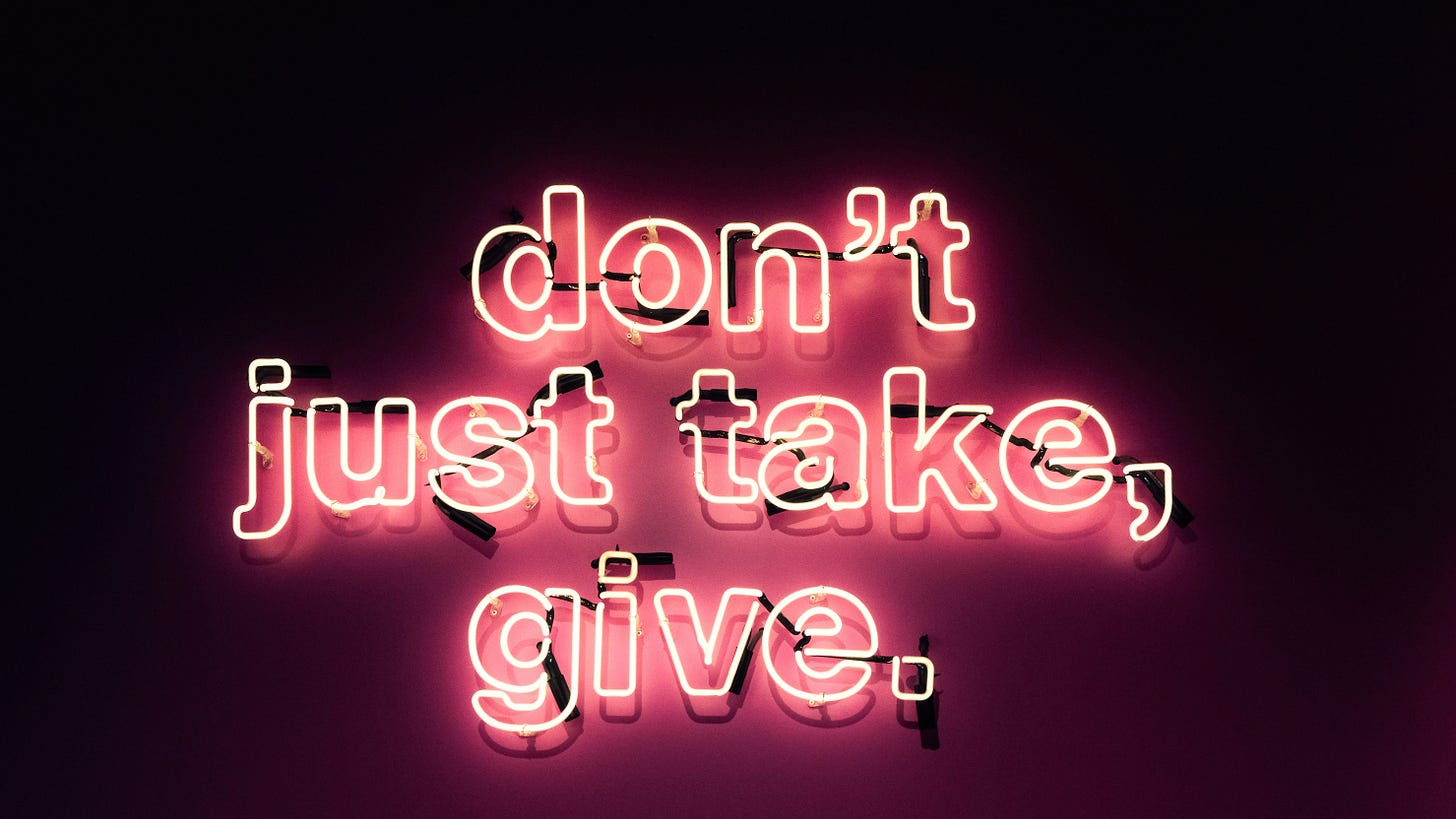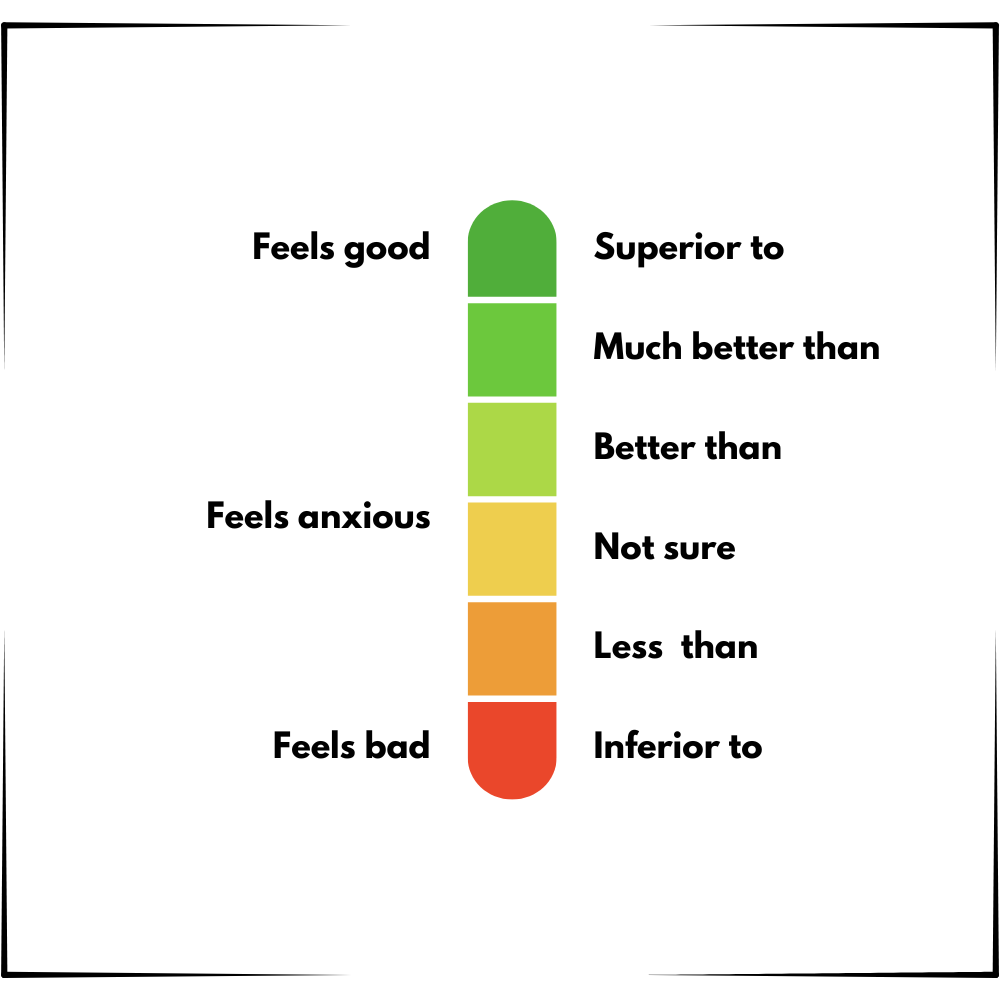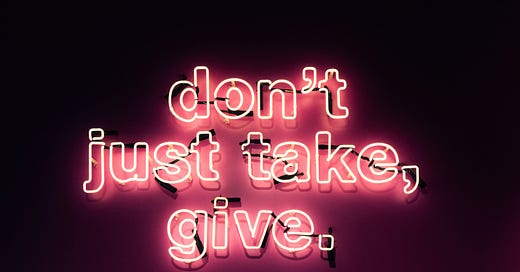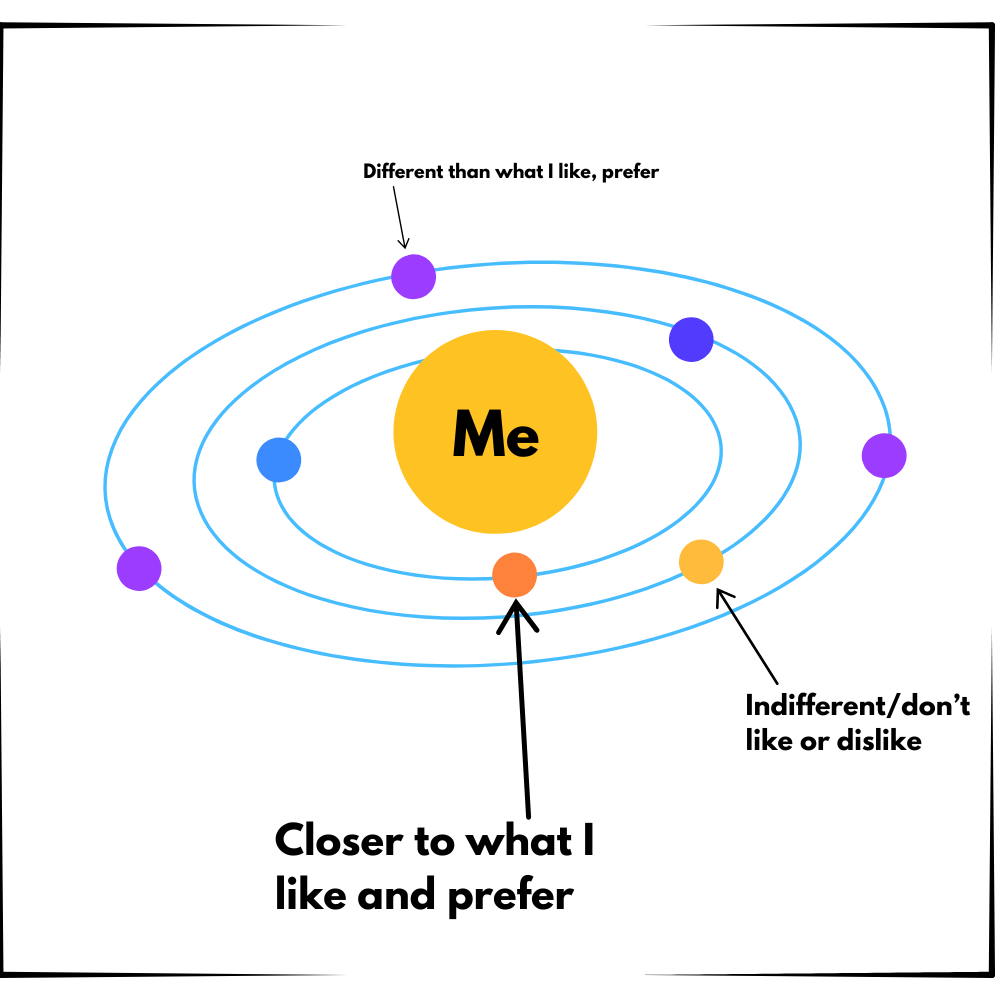No More Hot Takes - It's Time for Compassion
Let’s get real: we all judge. What if you could swap judgement for compassion?

We've all done it when we know we shouldn't - judged someone based on their opinion, taste, style, or how slow they drive on the highway. We judge people’s outfits, their behavior, the way they sneeze (and somehow don't need a tissue). It’s practically a reflex. It's the heart of our political divide - the slightest difference splits into us and them. I'm so tired of it. I'm going to argue for a different way of looking at things. By the end, I'll convince you to stop the madness and quit being so judgy. I promise, there's something BIG in it for you.
What is a Hot Take?
In my humble opinion (IMHO), a hot take is the newest term for running your mouth as if everyone cares about your opinion. Usually on social media, hot takes are knee-jerk responses, absent of reflection, and generally sprouting from the poster's managerial inner critic part. It's in the delivery - an opinion laced with emotion presented as fact. Not just your thoughts and ideas, it's paired with a certain affective emphasis. Needless to say, this type of expression isn't helpful. So why are hot takes so hot right now?
Feeling Judgmental
Let's examine what it feels like when we judge. It's a complex emotional state blending negative and semi-positive emotions. It's delicious and gross. Like really savoring McDonald's french fries - past the greasy goodness, it's cardboard (sorry to ruin it for you). Feelings of superiority, frustration, or irritation toward others, paired with a sense of righteousness or satisfaction. It tosses a heavy stone on the topic and forecloses conversation with the weight of criticism. It's also a release of sorts. Agitation remits once you click post.
Being judgy as a group is temporarily validating. Everyone belongs as long as they agree. Expressing judgment feels good because it releases tension and gets it out of your head. It's negative reinforcement in the same way smoking a cigarette relieves a nicotine craving. Ultimately, judgement creates and maintains emotional distance in relationships. For some, feeling too close is uncomfortable and judgment keeps an arm's distance. It's a fortress around you - both protective and isolating - and from within its walls, you can safely lob your hot takes. Everyone needs protecting but let's question what is it protecting. My guess is it's a wounded and vulnerable sense of self. In the IFS theory, it's one or more of your exiles - the inner little kid. Exiles are vulnerable parts who long to be seen but fear shame and judgment. Sensing danger, they hide behind walls.
Judgmental Mindset - An Evolutionary Perspective
While hot takes are the latest thing, judging has been around since the dawn of frontal lobes. Quick judgments helped early humans survive. In an environment riddled with hazards like poisonous fruits and predators, we evolved succinct methods to teach each other about danger - the emotional charge. Pairing the object with an ardent tinge emphasizes the importance of the message - This fruit is bad. Reinforced over generations, knowledge became instinctual, protecting us from harm.
Seems like a cool human strategy, right? What's so bad about judgement? Here's the thing - we're not in mortal danger anymore. We don't need it to survive. I'm pretty good at avoiding becoming some hungry tiger's dinner. Even though we've conquered past dangers, the judgment instinct lingers. Still scanning for threat, we now find it in other humans. It makes sense; humans have the power to cast us out of the tribe, sever the bonds of belonging, and condemn us to face existence without social resources. Survival depends on holding one's place in the social order. While all this is true, I'd argue there's still more evolving to do. Judging to avoid death is obviously useful but we can't cut out all people.
The World of Judgement
Let's define the modern version of judgment. When we're judgmental, we're viewing the world in a hierarchical, rank-order framework. It's the ruler mindset - we measure ourselves and others to see where each stand in comparison. Comparing things is just another way to measure ourselves. We like 'good' things and dislike the 'bad.' With both people and things, we implicitly pair facts with that emotional tinge to indicate what one should feel and where you, someone else, or some thing ranks on the grand scale of superior to inferior.
Imagine you're meeting friends for dinner and there's a new person. He's attractive, well dressed and has a great haircut. The group is asking him about his really cool job and he's friendly and engaging. You're an introvert who has to warm up in social situations. You threw on old jeans and a t-shirt for this event, ran a brush through your hair and now you're quietly listening to the group's conversation. These are the objective, observable facts. Can you feel your judgement creeping in? The dude isn't judging you - you're doing it to yourself preemptively.
Culturally, we assign 'goodness' to qualities like attractiveness and friendliness and 'badness' to aloof and under-dressed. If you judge your total value by these symbols, you'll rank yourself as 'less than' in the social pecking order. Think of these familiar phrases: out of your league, outclassed, that job is a pipe dream, punching above your weight or not in the same ballpark. We have a whole vernacular for the better than/less than paradigm.
Maybe you want to be a writer and you're into writing fan fic. Side note: fan fic (or fan fiction) is taking an existing storyline and adding to it, usually keeping the same characters. You love the Batman story and you've extended the storyline far past any of the movies. You think it's good writing and wish you could publish it somewhere but something holds you back - shame. The story you tell yourself is that writing fan fic isn't really writing. You think it's childish and indulgent. But you feel such joy and inspiration when you write it. Unable to reconcile these conflicting feelings, you judge yourself before anyone else can. Compromise, in the form of finding yourself 'less than', makes sense to protect and isolate you from predicted harm. But what if you've got it wrong?
Comparison reduces the full human to a few parts to symbolizes overall value. Based on a handful of metrics, you rank yourself 'better than' or 'less than' compared to another. Riddled with error and cognitive bias, judgment a form of stereotyping. The cheap boost to self esteem easily flips to self loathing, rejection and shame. It's hard to like yourself when you don't measure up. All humans, including you, are far more complex than we can quickly assess and we need cognitive shortcuts to process effectively. But the judgmental shortcut ends with a winner and a loser. Ambiguous ranking creates an anxious limbo state. Each time you use the ruler to compare yourself to someone else, it cuts one down to elevate another. Is this really the best way? Now that you know how the sausage is made, you can decide.

Paradigm Shift - The horizontal plane of mere difference
I've got a better idea. What if, instead of judging, we simply evaluated. Drop the outdated paradigm and think in terms of difference. You can still like or dislike something or someone. You can still have preferences. But stripped of the extra moralizing layer, you're left with a clean, factual evaluation, supported with evidence.
This way safeguards something far more important - your space in the world. We're each allotted space to feel what we feel, have our own opinions, and choose our actions. You don't have to agree with someone to respect their space. When you see the world in terms of difference, what you like or prefer is closer to you while what you dislike or wouldn't choose is farther away. Based on solid evidence, your assessments are more accurate and you're a better problem solver. Let go of being right all the time and becoming open to being wrong. You'll learn more and get wiser. Relationships are so much easier too because in respecting space, including your own, you'll automatically decrease or avoid unnecessary conflict.
Judgement brings the offensive object closer while evaluation simply turns away from it. Evaluation doesn't rely on comparison to validate your choices and worldview. If you like something, it's good for you. If you don't like it, don't have it in your life.
I can already hear your counterargument - sometimes we can't get away from the offensive thing. The difference is in your face and you've got to deal with it. It's true, whether it's a judgy family member, coworker or friend, the political climate, or discrimination based on who you are, there's always the possible threat of someone or something judging you. You need protection. Better to get ahead of it and judge them first, right? I still think there's a better way. Hiding in the fortress has its costs. What if you could continue to protect your space and learn to see others as separate from you. What if...you could find compassion?
Tips and Tricks
Above all, the best thing you can do to maintain your space in the world is to raise your own awareness. It's a head start to seeing reality more plainly. Start by paying attention to your inner monologue. Step back from the action and watch yourself. Take your emotional temperature. See if you can catch it the next time you feel tense and observe yourself feeling. Without judgment, comment on it in your head. Wow, I'm really reacting to this.
Be on the lookout for how you hear and internalize comments from others. We're interdependent, social creatures who rely on feedback loops to know ourselves and how we fit in. We are mirrors for each other - reflecting the outside back to the person inside. A fortress is impenetrable. Behind walls, you deprive yourself of a sense of belonging. You must risk opening the drawbridge. Screen whose opinions you let it. Become aware of how you feel in the presence of another. Does this person make you feel accepted and comfortable or do you pick up on a subtle sense of arrogance and boastfulness? Are they subtly judging you, putting you down, or pulling you into competition? People teach you about themselves from the jump. Learn to read the signs.
Once you've bolstered awareness, you'll get better at catching judgment in yourself and from others. In the first phase, it's always after the fact and correcting it in your mind. Start with strangers (it's easier). It goes something like this: Ugh, that lipstick looks terrible on her. --pause-- That wasn't kind. I just wouldn't pick that shade for myself. Or if you're feeling judged, He thinks I'm stupid. --pause-- He doesn't even know me.
Leveling Up
Less judgmental people automatically correct for the judgment in others. It's like you've got a force field. Judgment from the outside doesn't get inside you and stops feeling personal. For instance, someone can not like your cooking and still like you. You recognize even though everyone takes up space in the world, it doesn't have to overlap. When someone comes into your orbit, you don't have to breathe their air.
A great combo strategy for dealing with space is context and reframing. Context refers to seeing the bigger picture. A narrow focus misses facts and you'll fall back on that old, familiar story about others. Pull back and see context. Be curious about what motivates others. Everyone makes sense if you get enough contextual data. Once you have a greater understanding, reframe and respond to the deeper message. Some examples:
Your partner says the house is too messy.
*You could take this as a coded message that you're too messy
or not doing enough to clean.*
Instead, ask questions to get more information.
*Ok, what would you like us to do about it?*
*Can we work on de-cluttering the living room today?*
You tell your friend about your dream to move to Taos and become a painter. She says most painters don't make any money and it's expensive to live in Taos.
*You could take this as her raining on your parade - conveying
judgment by questioning your choices.*
Pause and think of the bigger picture - her comments in context of her worldview. She doesn't want you to be broke and would miss you. She's worried about your well-being. You acknowledge her opinions and ask her to trust you.Compassion - Becoming a Jedi Master
The more you practice awareness, contextualizing and reframing, the easier it gets. Your paradigm slowly shifts as you rely on new strategies to maintain your space. De-centering others allows you to center yourself. Refining thinking, aligning values and calibrating your actions accordingly makes you feel grounded and secure in yourself. New space opens up in the form of greater, proactive compassion for others. You've accepted the reality of human limitation. Looking for connection, you side-step and minimize potential conflict and focus on getting the best from your relationships. The practice of compassion means you look to understand others, in their unique contexts, and seek planes of similarity, no matter how narrow.
The Payoff
If you're looking for a more enriching and peaceful state of being, seeing the world in terms of distance and respecting each person's space is one concrete avenue to get it. The more you judge others, the more you'll judge yourself (and vice versa). The good news is that the same mechanism works in reverse: the more compassion and grace you have for others, the more you'll have for yourself. It's a gift for both of you. Be nicer to yourself. You'll end up being nicer to others too. And chill out on the hot takes. Wear the old jeans and write what you want. Observe and speak when you've got something solid to say. Your space is waiting for you.




